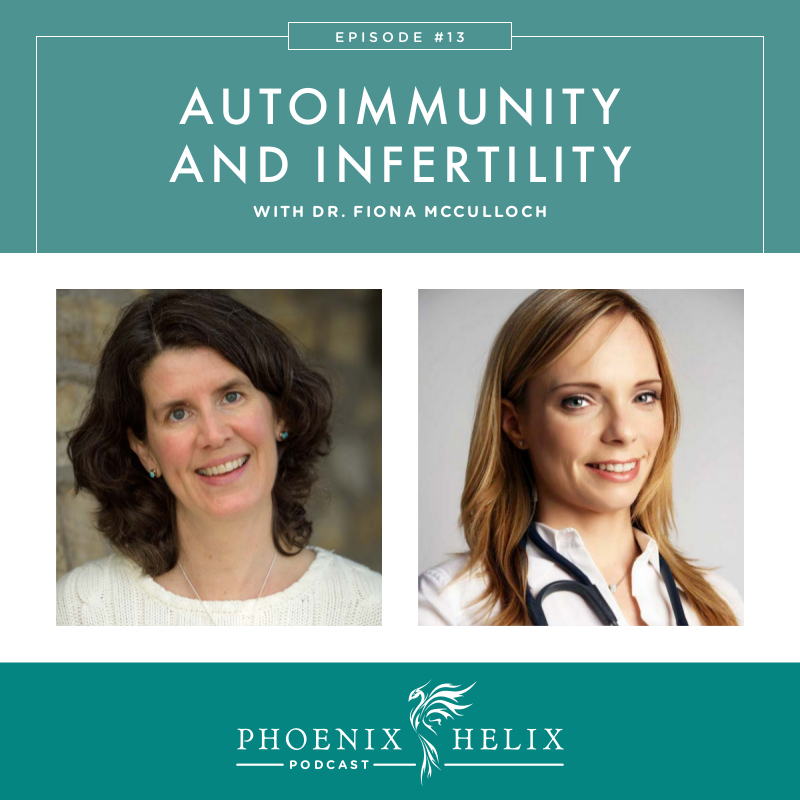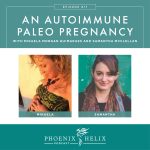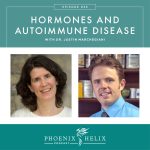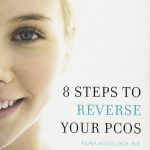What is the Connection Between Autoimmunity and Infertility?
Our guest today is Dr. Fiona McCulloch, a Naturopathic Doctor specializing in fertility. In her 14 years of practice, she has seen many patients who also have autoimmune disease. Some knew that in advance. Others she helped diagnose. Today we talk about that connection. Why do people with autoimmune disease often struggle with infertility? How can we reverse this problem and restore fertility again? We also talk about the connection between hormones and autoimmune flares, and how health on all levels begins at the most basic level – our cells.
Listen to the Show
- Subscribe to my podcast through your favorite podcast app: iTunes, Stitcher, Google, TuneIn, Spotify, Amazon, etc.
- You can also listen to the episode right here through the player below, and if you subscribe to my newsletter you’ll get notified of future episodes.
Podcast: Play in new window | Download
Show Notes
- Intro (0:00)
- Meet Dr. Fiona (1:09)
- A Naturopathic Doctor who specializes in fertility.
- She has PCOS herself, which she manages with diet, lifestyle and natural medicine.
- She recently completed a Whole30, and also went through Angie Alt’s SAD to AIP in SIX group. Dr. Fiona recommends both of these resources to her patients.
- Fiona’s mother has rheumatoid arthritis and struggled with infertility as well.
- What is PCOS? (6:49)
- Poly Cystic Ovarian Syndrome. It’s not an autoimmune condition, but inflammation is at its root, so a lot of the interventions helpful for people with autoimmunity also helps PCOS.
- There’s also an increased likelihood of developing autoimmune disease if you have PCOS, particularly Hashimoto’s.
- The Scientific Link Between Autoimmunity and Infertility (8:02)
- Inflammation isn’t a receptive state for egg implantation, and autoimmunity comes with a lot of inflammation.
- Immune system dysregulation also plays a role. Pregnancy is a Th2 dominant situation. People with autoimmune disease tend to be TH17 dominant, and they also have a deficiency of T regulatory cells, which is linked to miscarriages.
- Hormone imbalances also have a huge impact on both autoimmunity and infertility.
- Dr. Fiona’s Order of Priority in Treating Autoimmune Infertility (13:38)
- 1. Egg Quality – This is all about cell and mitochondrial health, which matches Dr. Terry Wahls theory that all health issues begin in the cells. Stress, inflammation and autoimmunity can all negatively impact egg quality. The paleo diet, plenty of healthy fats, moderate exercise, stress management and sleep can all positively improve egg quality. Supplements that are also helpful are mitochondrial antioxidants: Ubiquinol and PQQ.
- 2. Hormones – Many people with autoimmune disease have cortisol dysregulation and adrenal issues, resulting in low DHEA (an adrenal hormone). DHEA is essential to egg quality. There’s also an immunological connection between the adrenals and the ovaries, so supporting adrenal function and balancing hormones is essential to fertility. One important step is this process is entraining healthy circadian rhythms.
- 3. The Gut – Dr. Fiona recommends the Metametrix Microbial Ecology test to assess gut health, identify pathogens, and potentially find micro-organisms that are known to have a connection to autoimmune disease. She then treats any problems that are found, and restores healthy bacteria with probiotics. Some probitoics stimulate the immune system while others calm it down. She recommends the probiotics that are known to have anti-inflammatory effects: Lactobacillus Casei, Bifidobacterium Infantis, Bifidobacterium Longum, Lactobacillus Bulgaricus and Streptococcus Thermophilus. If you’re curious about a specific probiotic, type the name into PubMed, along with the word “immune” to learn its effect on the immune system.
- 4. Immune System – Increasing T regulatory cells helps balance an overactive immune system. Helpful supplements: Vitamin D, Wobenzym, EGCg from Green Tea, Pine Bark, Grape Seed. Proper methylation is also important, because regulatory cells have folate receptors on their surface, so discovering MTHFR mutations and treating as needed can be important.
- *All of these are interconnected.
- Success Story Case Study #1 (32:23)
- 36 year-old patient, diagnosed with premature ovarian insufficiency (very few eggs left). This is very common in people with Hashimoto’s, so Dr. Fiona ran antibody tests and discovered this patient had Hashimoto’s and was unaware of it. She had been trying to get pregnant for 3 years with no success. She had low DHEA, hormone dysregulation, gut pathogens, blood clotting issues, and high inflammation. They worked on all of these issues over 10 months with success. She conceived and gave birth to a healthy baby.
- What is the 4-R Gut Healing Protocol? (36:50)
- Remove – pathogens, parasites, infection, etc. Treat with herbal or conventional antibiotics.
- Restore – healthy digestion. Treat with HCL, digestive enzymes, as needed
- Reinoculate – probiotic therapy and a healthy diet. Dr. Fiona uses Natren probiotics in her practice, as well as her own formula of anti-inflammatory strains, which you can buy through her website. She also likes Prescript Assist, which you can buy through Amazon.
- Repair – gut lining by reducing inflammation and tightening cell junctions. Helpful supplements: L-Glutamine and Slippery Elm.
- Success Story Case Study #2 (42:23)
- Patient with rheumatoid arthritis tried to conceive for two years. She had miscarriages but no successful pregnancies. Her RA was severe, and she was in a lot of pain. Dr. Fiona began treating her for egg quality, which simultaneously reduced some of her inflammation. She got pregnant within 2 months, carried the baby to term and had a healthy baby. Sometimes, a small intervention can make a big difference.
- Autoimmunity and Pregnancy (45:49)
- Why do some people go into remission during pregnancy? Overall, pregnancy is a state of immune tolerance, where the body calms the immune system down to accept a new life growing within.
- Why do some people either develop autoimmune disease, or go into a flare after delivery? There’s a huge hormone shift, and as we’ve discussed, hormones strongly affect the immune system.
- Cravings: It’s normal to become insulin resistant during pregnancy, so the body is craving “sugar.” However, that’s not what it needs. If you eat more often and increase the healthy fats with all your snacks and meals, it can mitigate these cravings and keep your blood sugar balanced.
- Be kind to yourself. If you eat something you “shouldn’t”, forgive yourself and move on.
- Glutathione (52:44)
- It’s a special anti-oxidant that protects our cells bodywide from damage. It protects egg health, and T regulatory health, so it’s important for both autoimmunity and fertility.
- Supplements that increase glutathione: NAC, ALA, Selenium and Liposomal Glutathione.
- Outro (57:22)
- Dr. Fiona McCulloch has a clinical practice in Toronto but she also consults with people worldwide telehealth. You can connect with her through her website, blog, or Facebook. She’s also writing a book on PCOS, which will be published this year. Update: The book was published: 8 Steps to Reverse PCOS.
- Eileen (your podcast host) is the author of multiple books, written to help people thrive with autoimmune disease. Learn more on the Books Page.
- If you like this podcast, follow or subscribe through your favorite podcast app. You can also subscribe to Eileen’s biweekly newsletter.
- Check out the entire archive of podcast episodes.
You May Also Be Interested In
Spreading the Word
If you like the podcast, please leave a positive review in iTunes. It would mean the world to me, and also helps others find the podcast. Here are some quick instructions using your iPhone:
- If you are already subscribed to my podcast: (1) Click the purple podcast icon. (2) At the bottom of the screen, click Library. (3) At the top of the screen, click Shows. (4) Click the Phoenix Helix podcast image. (5) Scroll down the page, and you’ll see Ratings and Reviews. Scroll down a little bit more and click on Write a Review. This will bring up the review screen. Tap 5 stars (if you love the podcast), and then click in the title box, and it will bring up the keyboard. Enter a title and short review. (6) Click Send in the upper right corner. (7) Thank you! Positive reviews give the podcast a higher search ranking in iTunes, helping people find it and letting them know it’s a quality podcast and worth their time to listen.
- If you haven’t subscribed to my podcast: (1) Click the purple podcast icon. (2) In the lower right corner, click the magnifying class. (3) Type Phoenix Helix in the search box. (4) Click the podcast cover in the Show list. (5) If you’d like to subscribe, click the + sign at the top of the screen. (6) To write a review, scroll down the page, and you’ll see Ratings and Reviews. Scroll down a little bit more and click on Write a Review. This will bring up the review screen. Tap 5 stars (if you love the podcast), and then click in the title box, and it will bring up the keyboard. Enter a title and short review. (7) Click Send in the upper right corner. (8) Thank you! Positive reviews give the podcast a higher search ranking in iTunes, helping people find it and letting them know it’s a quality podcast and worth their time to listen.









very nice work ! More understanding than I have seen from many general REs in the field.
Hi Eileen!
Thanks a lot for this and all the other wonderful podcasts you have done so far. It is really a pleasure to listen to all of them.
I am interested in the probiotics which are anti-inflammatory.
I think that I react to some bacteria but I do not know which one.
Do you know if there is a list of all the bacteria which are anti-inflammatory somewhere?
Thanks a lot!
Hi Josef. Probiotics are immune system stimulants, so it’s not uncommon to have a negative reaction if you have autoimmune disease. It often takes trial and error to find one that works, and actually more and more doctors are recommending fermented foods instead. However, if you want to try the Dr. McCulochs anti-inflammatory blend, that information is listed in the show notes. It’s in the section where she talks about her order of priority in treating autoimmune infertiflity. She lists the ones she considers anti-inflammatory in Step 3 – The Gut.
I would love to read info on how autoimmune disorders can effect male fertility. It probably not studied much though. Also, more on the connection of autoimmunity and endometriosis/blocked tubes. Do you know of any resources on these topics?
Hi Chelsey. Since Dr. Fiona said that infertility is often a cellular/mitochondrial issue, I would think the same would apply to men. Just as eggs are cells, so are sperm. A lot of the interventions she recommends would apply, although I recommend consulting with her for details, as hormone imbalances would be addressed differently. As for endometriosis, that is theorized to have an autoimmune component. Here’s a good article Dr. Fiona wrote: http://www.whitelotusclinic.ca/endometriosis/
Eileen, how did you get your glutathione levels checked?
I did the urine organic acids test. It’s one of the tests Chris Kresser recommends the most, for showing in detail what’s going on with your body. It can be hard to interpret, so I had a functional medicine practitioner help me. That said, the report specifically recommended NAC due to “glutathione wasting”. You can order the test through Direct Labs: https://www.directlabs.com/TestDetail.aspx?testid=29